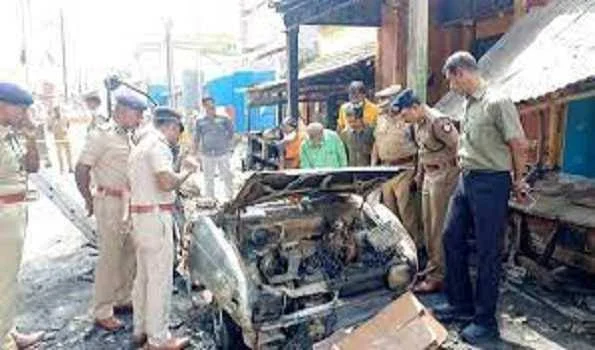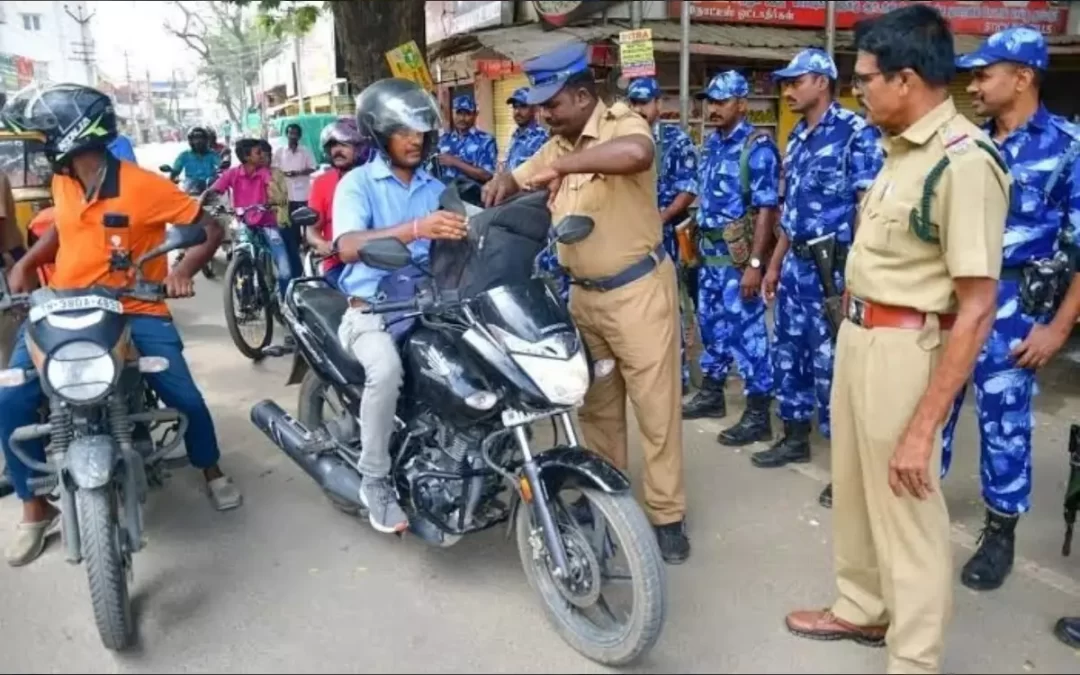Read in : தமிழ்
Over 24 years ago, Coimbatore was rocked by back-to-back bomb blasts at 18 places including the railway station, hospitals, markets and so on, claiming over 50 lives and injuring thousands. The gory scene of mutilated bodies lying in pools of blood amidst deafening cries of agony is still nightmarishly engraved in the psyche of one of the big cities in Tamil Nadu.
More than two decades on, a particular community is paying the price for a few people’s terrorisms triggered by anger and selfishness. The society’s perception of the community has changed for the worse. The stigma and social boycott have made life miserable for the community people.
Just when the rest of the city was becoming normal and a generation had passed in Muslim areas, the city was again rocked by the cylinder blast that investigating agencies believe is part of a wider terroristic conspiracy to attack the city.
The following effects of the bomb blasts are still felt now:
- Coimbatore, an industrial city, has undergone a makeover as a sensitive city always under the police scanner. Hence, it is economically affected
- Education of children in the families identified as linked to the blasts has become a big question mark
- Women are affected physically and mentally
- The families of those imprisoned have been hit
- Muslims of particular areas have been branded as a criminal clan
- Muslim areas have been ghettoized
- They are facing a double threat
Below are a few impassioned voices from there.
Feroze Babu, who has been running a fitness center for the past 10 years in the Rajaveedhi area near Kuniamuthoor, says: “Usually youth come to my fitness centre. Some who run shops nearby also come here after 8 pm. Some of the youths coming here sport beards. As Islamic youths have been arrested in the recent car bomb blast case and the son of Nawab connected with the 1998 blast case has also been arrested, other communities feel threatened by the Muslims. As the youths sporting beards are coming to my center, my owner of the premises advises me to keep such youths away as he says they seem to be a threat. Otherwise, I may be asked to vacate the place.”
Also Read: Nod for NIA probe of Kovai blast deflates BJP attack
Feeling miffed at the society’s general perception of Muslims as a potential threat, Feroze Babu asks why a community as a whole should be ill-treated just because of a few people’s wrong-doings. “Supposing someone sporting a tilak on the forehead is arrested in the bomb blast, should all people with tilak on the forehead be viewed with suspicion?” he says.
“I have been living with a stigma that I am the wife of a convict. Nobody rents house for me, nor gives me a job. I have been selling garments from door to door to earn a livelihood.”
Salim, a youth, raises a similar question. “My name is Salim and my beard are my identity. But just because the accused in some criminal cases sported beards and had Muslim names, should I also be looked upon as a person prone to crimes? If a beard is the major mark of a criminal, should all Sikhs be treated as terrorists? Even Hindu spiritualists are also sporting beards. Will they be called extremists on that count?”
Abbas, who was 18 years old during the 1998 bomb blasts in Coimbatore, is now about 42 years old. He reconstructs some nightmarish scenes of the notorious event: “In 1998 all shops on the NH Road were looted. Shoba Textiles, one of the major hallmarks of Coimbatore, was so famous then that people coming here from several parts of the country would visit the shop and purchase garments. I witnessed some hooligans from some suppressed communities in the Kottaimedu region, who were hired with money and liquor, going on the rampage and ran way with the booty looted from Shoba Textiles. Consequently, the owner lost business and went out of the city.”
“Roadside peddlers of commodities through carts were attacked and their wares looted. They lost their livelihood. Several traders turned coolies overnight and some became so desperate that they committed suicide. The Islamic community living in the regions of Kuniyamuthur, Kumaran market, Karumpukkadai and Ukkadam was scattered after the riots. Nobody knows where they were gone thereafter. Several shops owned by Muslims belong now to other trading communities. Our community torn apart about 24 years ago is yet to be consolidated with our livelihood and business usurped,” says Abbas.
Says Farida, whose family is one of scores of families affected by the riots that followed the 1998 bomb blasts: “I was 15 years old when the riot took place. The police personnel who broke into our house went on the rampage. As we were shivering in fear, one of the cops attacked me on the chest by the butt of a gun. The pain still persists even after several years. My father died. I have two brothers and seven sisters. As the police whisked away all men in our family, for livelihood we, Muslim women, flouted our taboo on women going outside for job and have been earning. On the one hand, we have to support our family and on the other, we are struggling to get our men released from prison. We have lost a generation.” As she narrates her tale of woes, her eyes turn watery.
Also Read: After BJP bid to politicise car blast, DMK toughens stand against RSS
Mariam, wife of a man languishing in jail for the past 24 years, says, “I have been living with a stigma that I am the wife of a convict. Life is hellish for me. Nobody rents house for me, nor gives me a job. I have been selling garments from door to door to earn a livelihood. With my two-year-old kid, I am unable to do multi-tasking: doing domestic chores, taking care of the kid, going out for earning livelihood…. I am unable to answer my kid’s question when his father will come back home. My husband, who had been educated only up to class 4 when he went to prison, has now finished college education by post and got two degrees. We have been waiting for his return and reunion with family. Whenever we go to see him in prison, it costs us Rs.20,000 to Rs.30,000. We are unable to afford the expenses. No organization nor any political party helps us. They use us as political pawns only.”

The 1998 blasts case is treated as a black mark that rubs off on the male descendants of the jailed Muslims. Talking about this problem, Kathija says, “My brother is in jail now. We have lost a generation. The male members of our families are also targeted just because their fathers or male relations were imprisoned in the blast case. Six months ago, the son of my sister was implicated in a case. It is now a tough job for us to save our boys and young offspring from the police harassment.”
Kathija continues to say, “For important events like wedding or death in the families, the imprisoned men are let off on parole only for a few hours. Last year, my relation’s mother died. Her son was only allowed to see her face. It is quite painful to show our children to the prisoners behind bars.”
Writer Samsudeen Hera says that Coimbatore South is yet to bounce back economically though over two decades have passed by after the nightmarish bomb blasts. “A single community (Muslims) has lost its businesses and livelihood. Most of them were alienated from the people of other communities.”
Siddhique recalls that it was only the Muslims’ shops that were targeted. A big furniture shop was reduced to ashes in the riots. Its owner is running a petty footwear shop in the corner of a street. After the riots, Muslims had lost social respect. Nobody would rent houses for them nor jobs. Some Muslim brothers have become auto drivers. “If anything untoward happens anywhere in Coimbatore, the police force descends on the Muslim-concentrated areas such as KK Nagar, Kuniyamuthur, Ukkadam etc. as if we Muslims are the potential criminals. Following the October 23, 2022 car bomb blast, 20 police posts were set up in our area as a precautionary measure.
Car bomb blast happened somewhere also. But the Muslim areas instantly come under police surveillance. Hence, our child cannot step out of houses to go to schools. An atmosphere of fear is created in Muslim settlements. The police have been on duty in our area for the past one week; has anything bad happened to them? We Muslims are too engaged in rehabilitating ourselves in terms of education, economy and livelihood. So, we have no time and no intention either for terrorist activities which the common people of all religions are not definitely inclined towards. Even after over two decades, we are labeled with terrorist tag. It is quite disturbing.”
Writer Samsudeen Hera says that Coimbatore South is yet to bounce back economically though over two decades have passed by after the nightmarish bomb blasts. “A single community (Muslims) has lost its businesses and livelihood. Most of them were alienated from the people of other communities.”
A cross-section of Muslims says that the same people, who once lived in peaceful co-existence with Muslims, are now distancing themselves from the Muslim youth who are finding it tough to move about in society, in educational institutions and workplaces quite as freely as other people do. “Don’t we deserve a decent and dignified life?”. This question still rings ominously.
For most of the Muslims in Coimbatore south, the recent cylinder blast has come as a jolt. They are wondering what this will do to their day-to-day lives and what will be the repercussions on them as common folk.
Read in : தமிழ்











